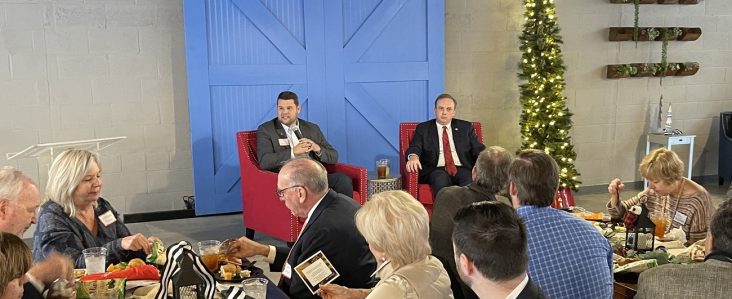Senate, House leaders: Prisons, tax cuts, schools come first
by December 5, 2022 6:05 pm 934 views

Sen. Bart Hester, R-Cave Springs, (left) and House Speaker Matthew Shepherd, R-El Dorado, (right).
Arkansas state legislators will prioritize prison reform, income tax cuts and education reforms, two leading legislators said Monday (Dec. 5).
Incoming Arkansas Senate President Pro Tempore Bart Hester, R-Cave Springs, told the Political Animals Club at the Red & Blue events center in Little Rock that those issues will lead the upcoming legislative session. Speaker of the House Matthew Shepherd, R-El Dorado, agreed they will be leading issues.
In fact, Hester said no other issues should be prioritized until those three are finished. In response to a question about higher education, he said, “I would say our higher [ed] institutions are very critical to the success of Arkansas, but I have zero interest in focusing on higher ed until K-12 is decided, prisons are decided, and income taxes are decided.”
Regarding prisons, Hester said county jails are full and that more state prison space is needed.
“We’re going to build a prison, and I’m going to want to build a bigger one than anyone,” he said. “So I’m for locking up repeat violent offenders. If our streets aren’t safe, then we can’t educate our kids and we can’t get jobs to the area.”
He noted that after Arkansas cut its top income tax rate to 4.9%, Missouri lowered its rate to 4.5%.
As for education reform, Hester said students are not reading at grade level, and if young people can’t read, they are in a pipeline to prison. In 2022, 35% of third graders were proficient on the ACT Aspire 3rd grade reading exam.
Asked by an audience member about legislative support for school choice, Hester said, “I think that is yet to be determined, but I can assure you that from my perspective, it will be as aggressive as possible. We have to focus on the children, keep our eye on the child and the child reading, and not the school or the school district or what the type of school institution that is. We’ve got to start focusing on the kids, and if the kids can read, we can readjust.”
Proponents of school choice want students to have greater freedom and resources to choose their school method, including private schools and home schools. Legislators in recent years have expanded programs that provide scholarships to students through tax-credited donations to private organizations.
Shepherd said lots of discussion is occurring about the details of school choice policy and that legislators have many different ideas.
As for higher education itself, Hester said, “I would say we’re dealing with adults at that point, and if they are putting out a product that the free market values, they will pay for it.”
He said another issue with higher education is that the pool of available students has shrunk.
Hester said that in the Senate, Sen. Breanne Davis, R-Russellville, will lead education reform; Sen. Ben Gilmore, R-Crossett, will lead prison reform; and Sen. Jonathan Dismang, R-Beebe, or Sen. Jimmy Hickey, R-Texarkana, will lead tax reform.
This will be Shepherd’s third legislative session as Speaker of the House. He said one reason returning appealed to him was that he hopes to restore normal functioning after the previous session was disrupted by the COVID-19 pandemic.
He said the pandemic affected lawmaking because it discouraged face-to-face meetings and moved typically front-running issues to the back as well as brought much federal money to the state. Between the 26 new members and those whose first session was the last one, many legislators have never had a normal session. A 27th member, Rep.-elect Grant Hodges, is returning to the House after a two-year hiatus.
In another pandemic-related topic, the two discussed what should be done with Arkansas’ hundreds of millions of dollars in remaining federal COVID funds. Shepherd said some members want to wait on spending the funds, while others want to spend it. Hester said he didn’t want to spend the money and then realize it is needed to pay for other needs.
